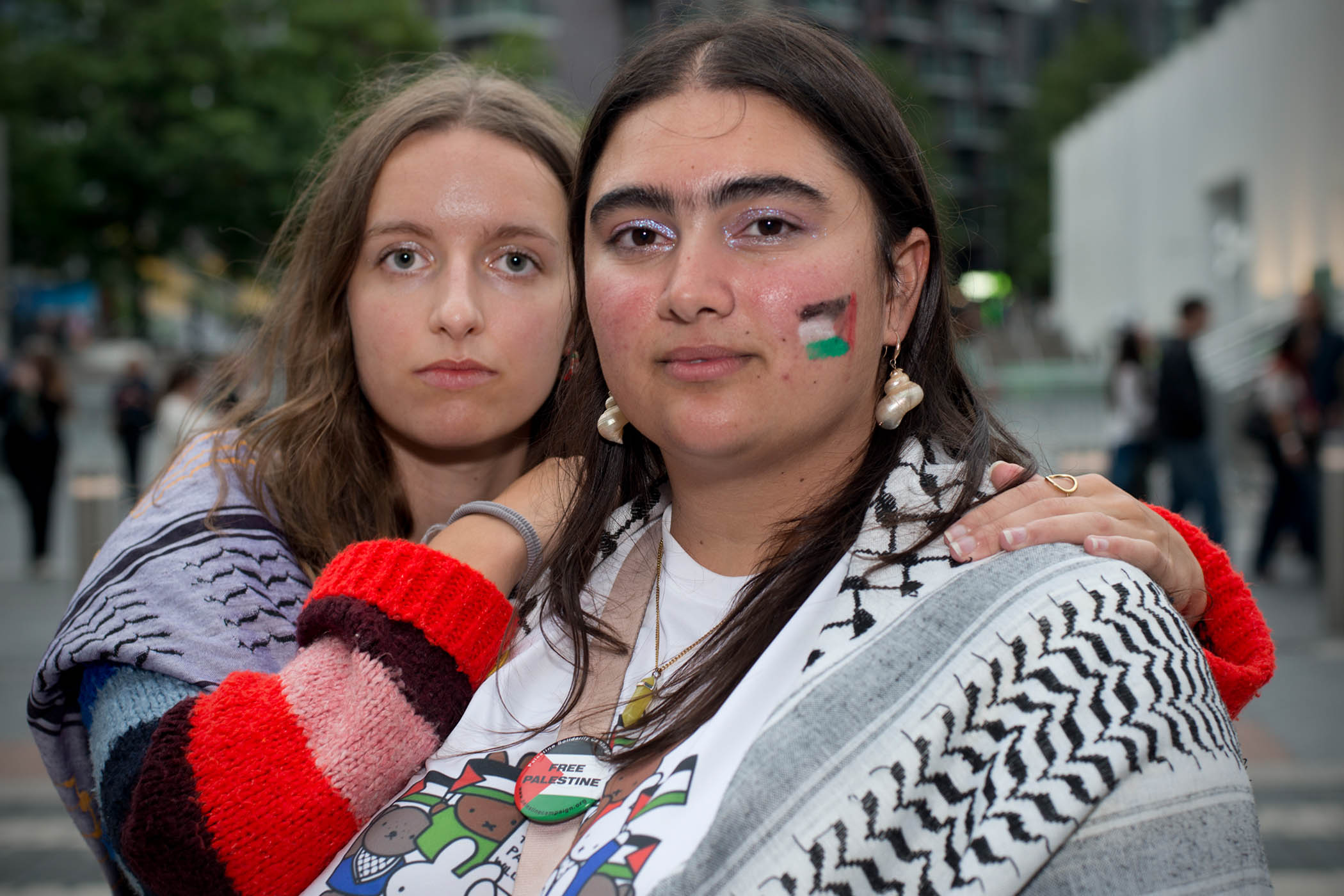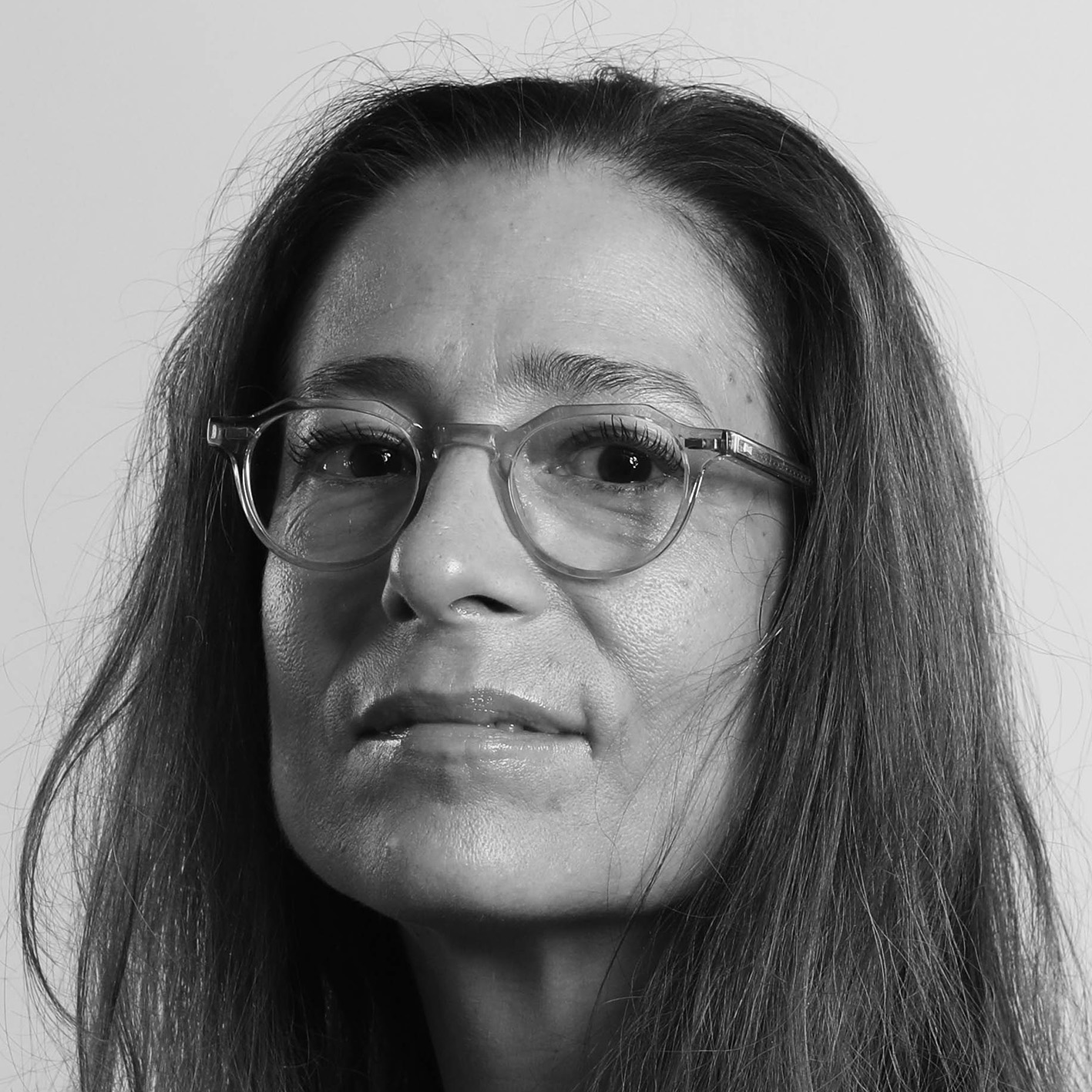Portraits by Sophia Evans
People are on their feet, screaming, roaring, stamping and whistling. The recipient of this standing ovation isn’t the band Gorillaz, or the actor Benedict Cumberbatch, both present tonight at Wembley Arena, or indeed, this concert’s organiser, the storied creative Brian Eno. It is Francesca Albanese, an Italian lawyer and UN special rapporteur for the occupied Palestinian territories. And the applause begins before she starts speaking eloquently of “a genocide that kills not only with bombs, but also with thirst, hunger, infection … Each life is a universe, forever gone.”
On 16 September, a UN commission of inquiry described Israeli military actions in Gaza as a genocide (though this is not the official position of the UN).
Albanese’s speech is just one of the many gooseflesh moments of Together for Palestine, a concert organised by Eno, with 100% of proceeds going to the non-governmental organisation Choose Love in support of Palestinian-led charities such as Taawon, the Palestine Children’s Relief Fund and Palestine Medical Relief Society. At the start of the night, they had half a million pounds in the bank; by the end, it’s closer to £1.5m. The crowd are of all ages, many sporting keffiyehs. Some are moved to tears, others to dance. Gorillaz play a new track, with guests including Yasiin Bey and the Syrian wedding singer Omar Souleyman. Eno performs with a supergroup, including Paul Weller on guitar. Neneh Cherry joins Greentea Peng and Bastille’s Dan Smith for a rendition of her song 7 Seconds. Portishead send a film of the reunited band playing Roads. Really, though, Albanese is the rock star of the night.
“Such cruelty did not start 700 days ago,” Albanese goes on, referring to 7 October 2023, when the terrorist organisation Hamas killed more than 1,000 Israelis and took at least 250 hostages, almost 50 of whom remain in captivity, and Israel responded with military action that has ended an estimated 65,000 lives, the majority civilians, and levelled sections of Gaza.
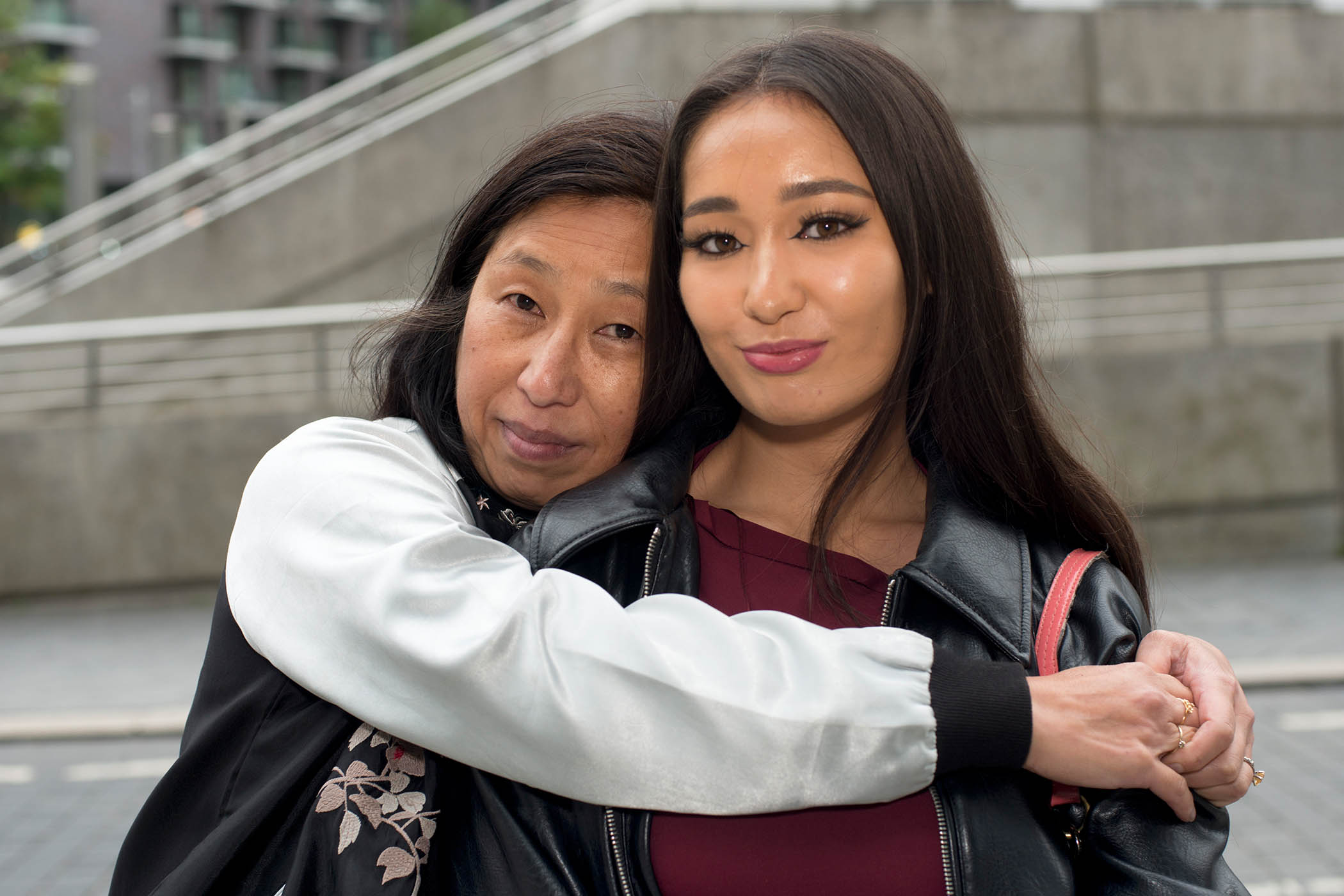
Tomoko and Chantelle, from Bournemouth outside Wembley Arena. Chantelle: ‘A cause like this brings us all together’
Her words are unsparing about the causes of the humanitarian crisis there. “For nearly a century, the Palestinian people have lived under the weight of a brutal secular colonial project, a perpetual occupation justified as security and enforced through apartheid. And while no state is innocent, the west carries a particular responsibility. Britain,” – growls, and cries of “shame!” from the crowd – “planted the seed of this catastrophe with the Balfour declaration, promising away a land that was never theirs to give.”
There are many more impassioned speakers tonight, including medics, aid workers, the Holocaust survivor Stephen Kapos. Their testimony is often painful to hear. But the evening is mostly dedicated to music, poetry and art, with Palestinian artist Malak Mattar’s Guernica-like painting No Words (2024) among many projected as a backdrop. The Palestinian singer Nai Barghouti, is a particular revelation, alongside jazz pianist Faraj Suleiman. Yet it is Eric Cantona who utters the most succinct soundbite, calling for Uefa and Fifa to kick Israel out of football, citing the sporting boycott of apartheid South Africa years ago. “It’s time for everyone to get off the sidelines,” he says.
Many of us probably feel that we don’t need musicians, actors or retired footballers to make clear that Palestine has become one of the burning moral issues of our time. But 2025 has seen an surge of expressions of solidarity and disruption affecting events such as the Eurovision Song Contest and Glastonbury. Students receiving A-levels and the actor Hugh Bonneville have interrupted filmed interviews this summer to draw attention to Gaza.
Concern for the plight of the Palestinian people used to be confined to the more left-field and left-leaning corners of cultural endeavour. In a few short months however, engagement with the horrifying humanitarian situation in Gaza has gone, if not exactly mainstream, then far closer to it than before: from previously little-known polemical rap duo Bob Vylan, who chanted anti-Israel Defense Forces slogans at a concert this summer, to household names Paloma Faith and Annie Lennox. This gig is not in a draughty trades hall, but Wembley Arena. YouTube is livestreaming the event.
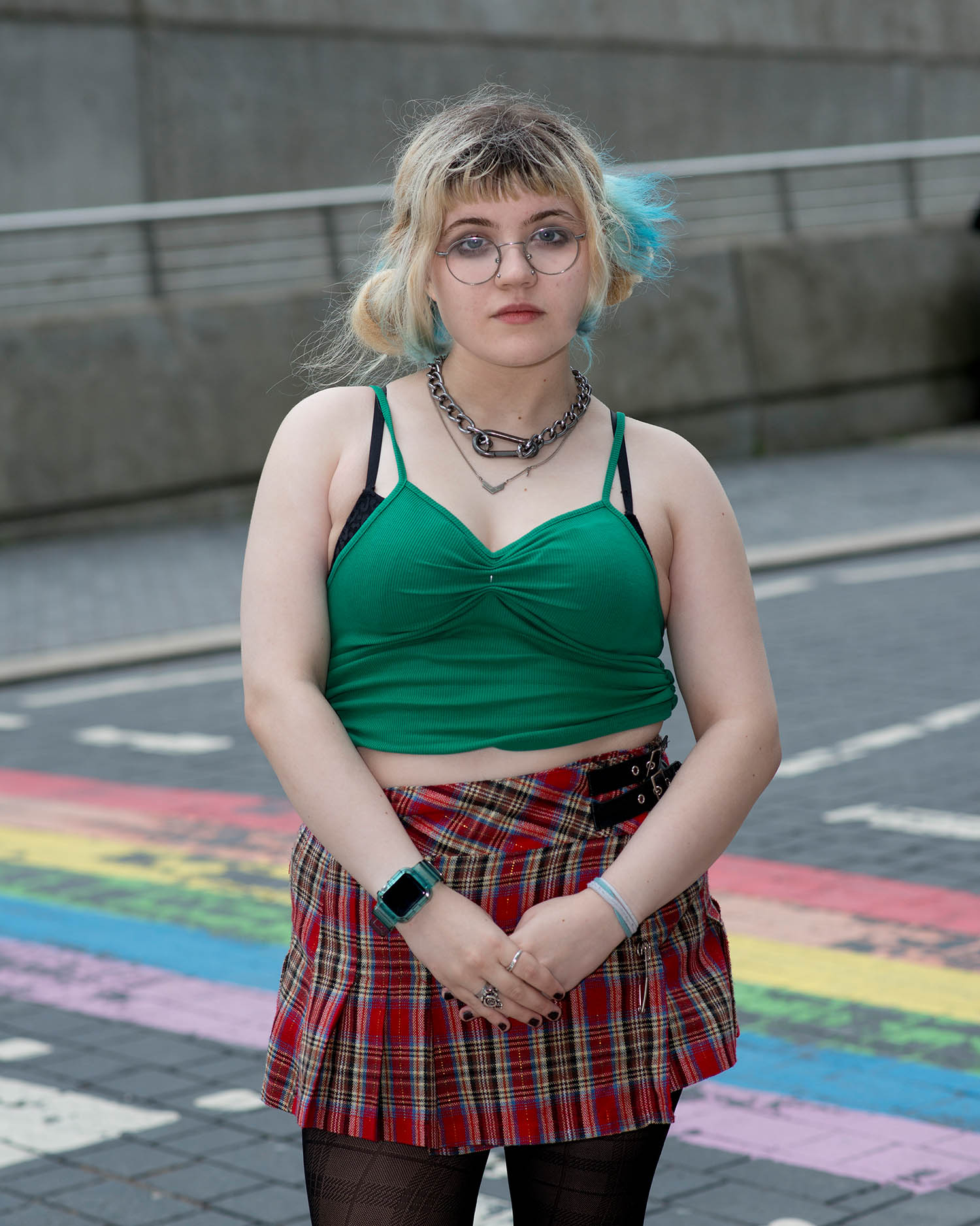
Vi, 22, from the Isle of Wight: ‘It is important to support this message for me and my moral compass’
Such political statements are no longer confined to bands such as Kneecap, the Northern Irish rap outfit who used their Coachella festival slot in the US in April to lead chants for a free Palestine and called Israeli action in Gaza a genocide, sparking controversy and a string of charged live appearances. It’s telling, though, that the band’s fortunes have only grown, climaxing with a gig of their own at Wembley Arena. Separately, the group’s Mo Chara (Liam Óg Ó hAnnaidh) is alleged to have displayed a flag of the proscribed Lebanese militant group Hezbollah at a gig at the O2 Forum in Kentish Town, London, last November and has been charged with a terror offence. A judgment on whether the case can be brought is due on 26 September.
Elsewhere, Kneecap’s countrymen Fontaines DC, a post-punk band, have called for a free Palestine throughout their recent run of gigs. At the beginning of the year, they partnered with the Dublin football club Bohemians FC to create shirts whose profits benefit the charity Medical Aid for Palestine. The climate activist Greta Thunberg has recently worn one on board the flotilla attempting to break the Israeli aid blockade of Gaza.
The Bristol trip-hop band Massive Attack, meanwhile, have been politically active for decades. Their solidarity with Palestinian refugee charities began as long ago as 2005; their gigs this summer had as backdrops unsparing footage of the destruction in Gaza, created in collaboration with the film-maker Adam Curtis.
Even at the other end of the pop spectrum, Eurovision, once a frothy redoubt of escapism, has become increasingly embroiled in debates over Israel’s participation in the song contest. National broadcasters from Ireland, the Netherlands, Slovenia, Iceland and Spain have threatened to boycott next year’s event if Israel remains involved. If it has felt to many for some time that the situation in Gaza has not been a controversy, but a desperate humanitarian emergency, it now feels that the call to cut off the flow of arms and cultural goodwill from the Israeli war effort is imperative.
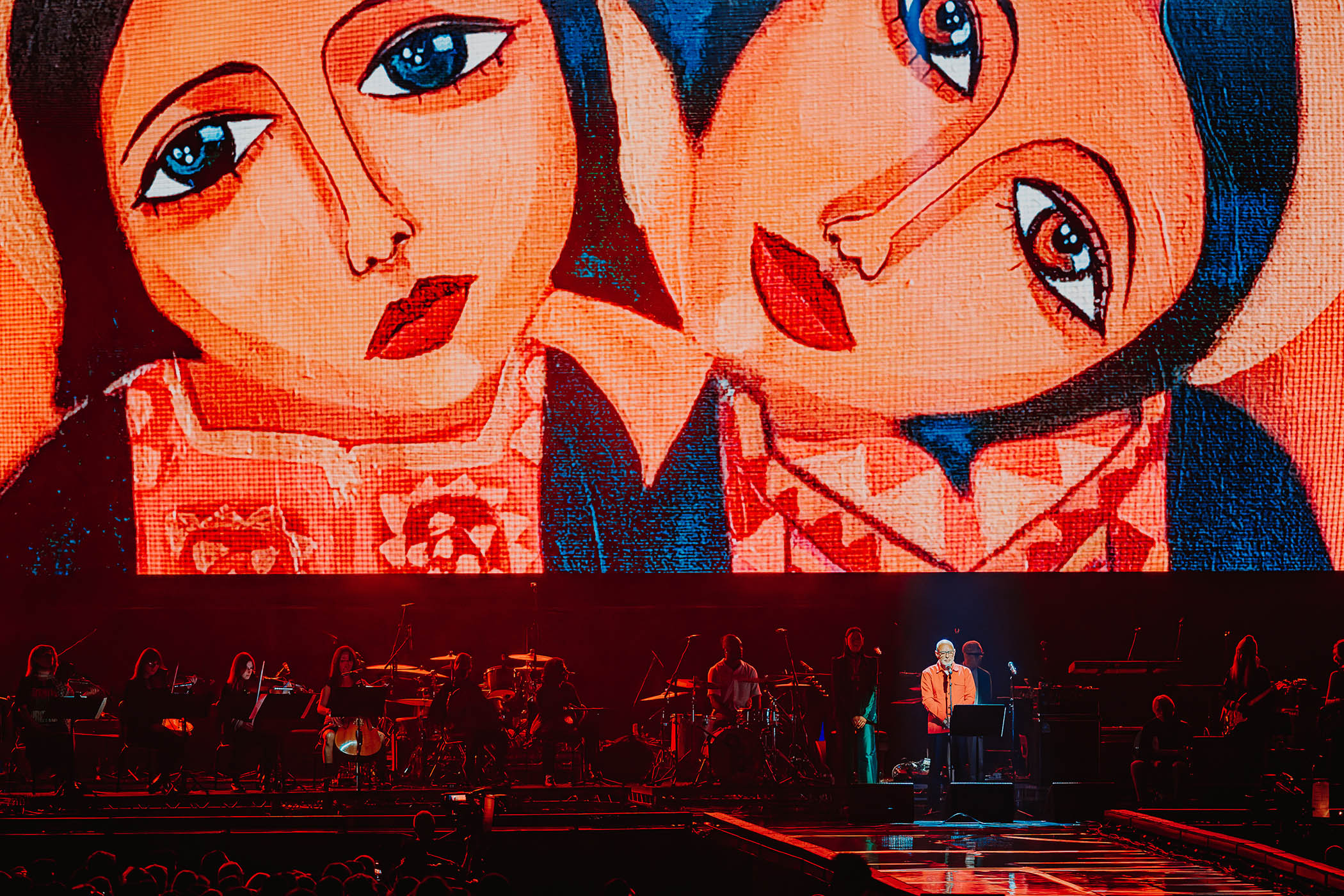
Brian Eno on stage at the Together for Palestine concert at Wembley Arena
Change has always had a soundtrack. The long arc of the moral universe, famously described by Dr Martin Luther King Jr as bending towards justice – even if it feels increasingly long in 2025 – has been accompanied by a spectacular array of rousing tunes. From the deep mists of folk music that told of the hardships and injustices meted out on the poor, to the songs sung by enslaved people and the new North American genres they spawned, to the wider ructions of the 20th century, musicians have held multiple roles: bearing witness, supplying anthems, moving dials.
This current moment has several precedents. But in many ways, today’s Palestinian solidarity movement most closely resembles the anti-apartheid activism of the 1980s; a time when cultural boycotts came into their own and musicians played a starring role. In 1985, Steven Van Zandt and producer Arthur Baker organised Artists United Against Apartheid; their song Sun City railed against artists who played South Africa’s casino resort of the same name.
Gradually, Nelson Mandela moved from imprisoned terrorist to head of state. And it was South Africa that brought the case for genocide in Gaza to the international court of justice. “I hope tonight’s gig will have the same galvanising effect as the 1988 Nelson Mandela concert – and give people courage to speak out about Gaza,” Eno wrote in the Guardian before the gig.
In this febrile atmosphere, fans and social media commentators have increasingly agitated for all artists to declare a position on Gaza. “Which side are you on?” they ask, just as Florence Reece, the wife of a Kentucky union organiser, demanded in her 1930s song, popularised by Pete Seeger.
Some have responded with urgency. Canadian R&B star the Weeknd (Abel Tesfaye) has repeatedly donated millions of dollars to UN food relief efforts in the region, beginning in 2023.
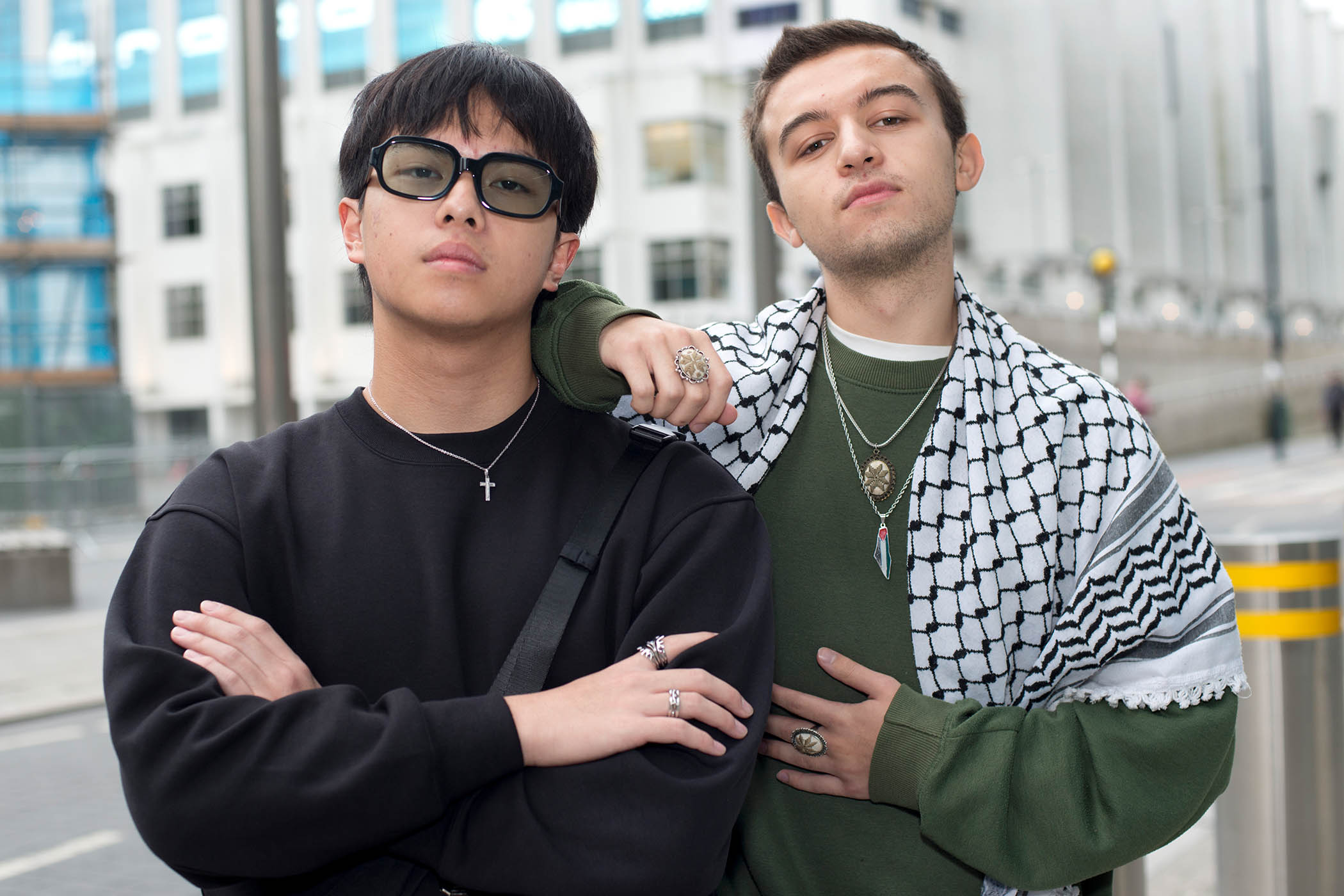
Ian and Kaan, both 19, from London. Ian: ‘Music feels like a very universal language. It bridges the world between thoughts and emotions’
The Irish singer CMAT recently said in this newspaper: “The musicians who haven’t said anything are of no interest to me. I’m not gonna name names because I don’t wanna get death threats from any fucking fan clubs. But you know who I’m talking about.
“Those big American pop stars who haven’t said a fucking peep – I don’t know how they’re doing it,” she said. “Are you scared of, like, not making money any more? Because you’re gonna make money. Maybe not as much. Maybe not hundreds of millions – just tens of millions. Sad.”Gen Z star PinkPantheress said in the Guardian earlier this month that “so many people have been afraid of saying the wrong thing, but are now realising that silence is also a statement”. She went on: “There’s been this shift where artists see that their platforms actually matter – and that it is their responsibility to amplify the call for justice. Neutrality shouldn’t be an option.”
If divisions in the world of music feel particularly acute now, it’s instructive to see them in the context of the past few years. While some artists believe it is their responsibility to use their platforms, others have felt that the artist’s role is outside politics, or that entertainers should not speak beyond their areas of expertise. Some resist being railroaded into positions by external pressure.
In 2024, while Radiohead singer Thom Yorke was touring Australia as a solo artist, he was heckled about Palestine. (In 2017, Radiohead had resisted calls to stop touring in Israel; in June 2025, the boycott, divestment, sanctions (BDS) movement called for a boycott of Radiohead concerts.) In May, Yorke issued a statement about the heckling incident, and his silence afterwards.
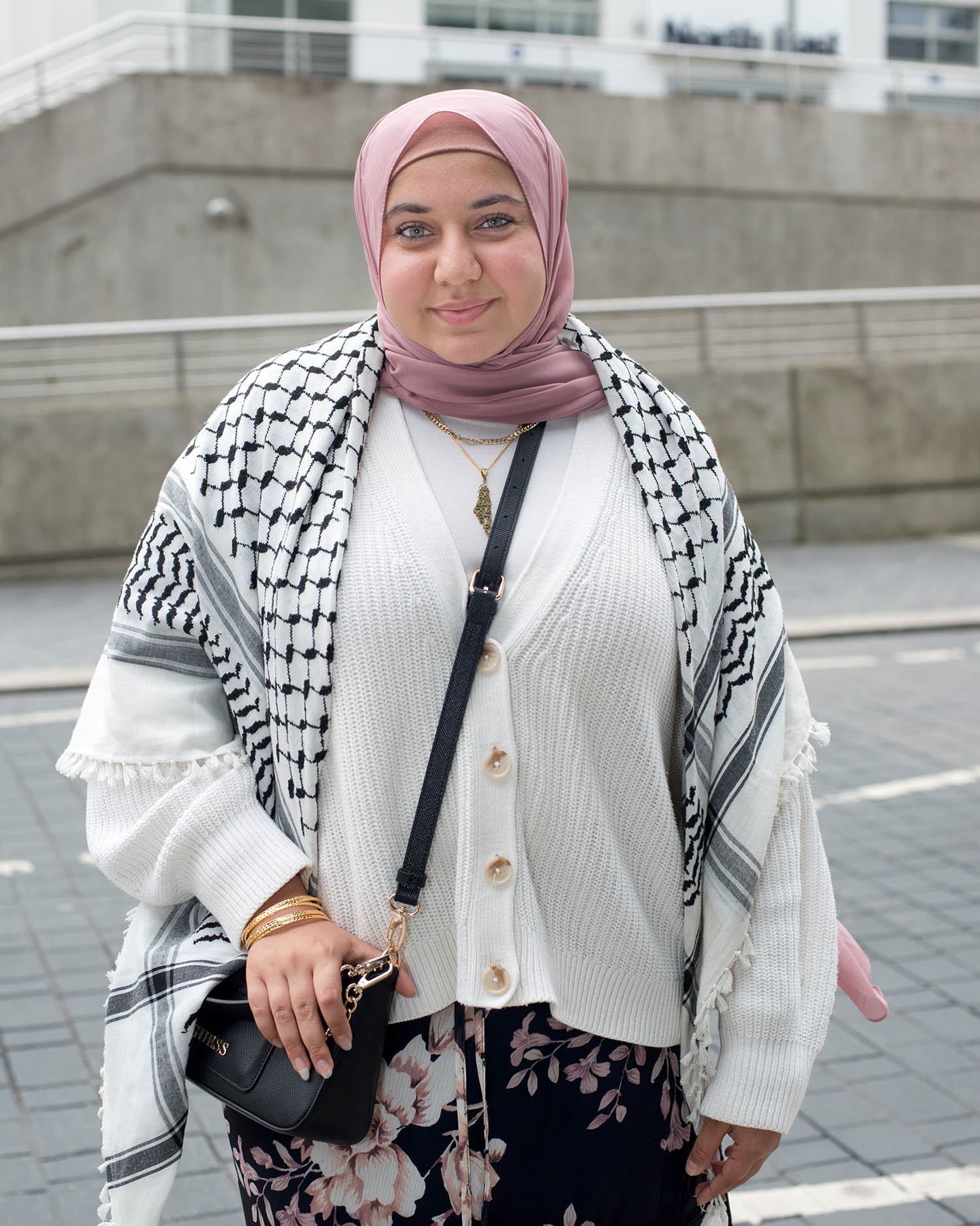
Reem, 18, is Palestinian and lives in London: ‘When artists use their music to educate, it can be an influential force’
“Some guy shouting at me from the dark last year when I was picking up a guitar to sing the final song alone in front of 9,000 people in Melbourne didn’t really seem like the best moment to discuss the unfolding humanitarian catastrophe in Gaza,” Yorke wrote. “Afterwards, I remained in shock that my supposed silence was somehow being taken as complicity.” He went on to condemn the aid blockade and the government of Benjamin Netanyahu but pleaded for a nuanced understanding of the region’s pain and condemned “social media witch-hunts”.
Musical strength of feeling for the Palestinian cause has reached a climax this summer. But the Together for Palestine gig feels like the culmination of many years of campaigning by a handful of arts figures; a bass note that has throbbed steadily in the background. The Wembley gig’s convenor, 77-year-old Eno, has been pivotal. He has been vocal in support of Palestinian suffering for many years. In 2006, he was a signatory to a letter in support of a cultural boycott of Israel.
“I started out being a very strong supporter of Israel, which I saw as being this socialistic experiment in building a new state,” said Eno in GQ magazine in July. “It took me about 45 years to realise that there were other people there as well – that it wasn’t a land with no people for a people with no land.”
About 10 years ago, Eno attempted to persuade fellow artists not to tour in Israel, among them, the singer Nick Cave, who played in Tel Aviv in 2017. In 2018, Cave responded eloquently to Eno, one of his musical heroes; the exchange was recorded on Cave’s website, the Red Hand Files. Cave wrote: “I do not support the current government in Israel, yet do not accept that my decision to play in the country is any kind of tacit support for that government’s policies.
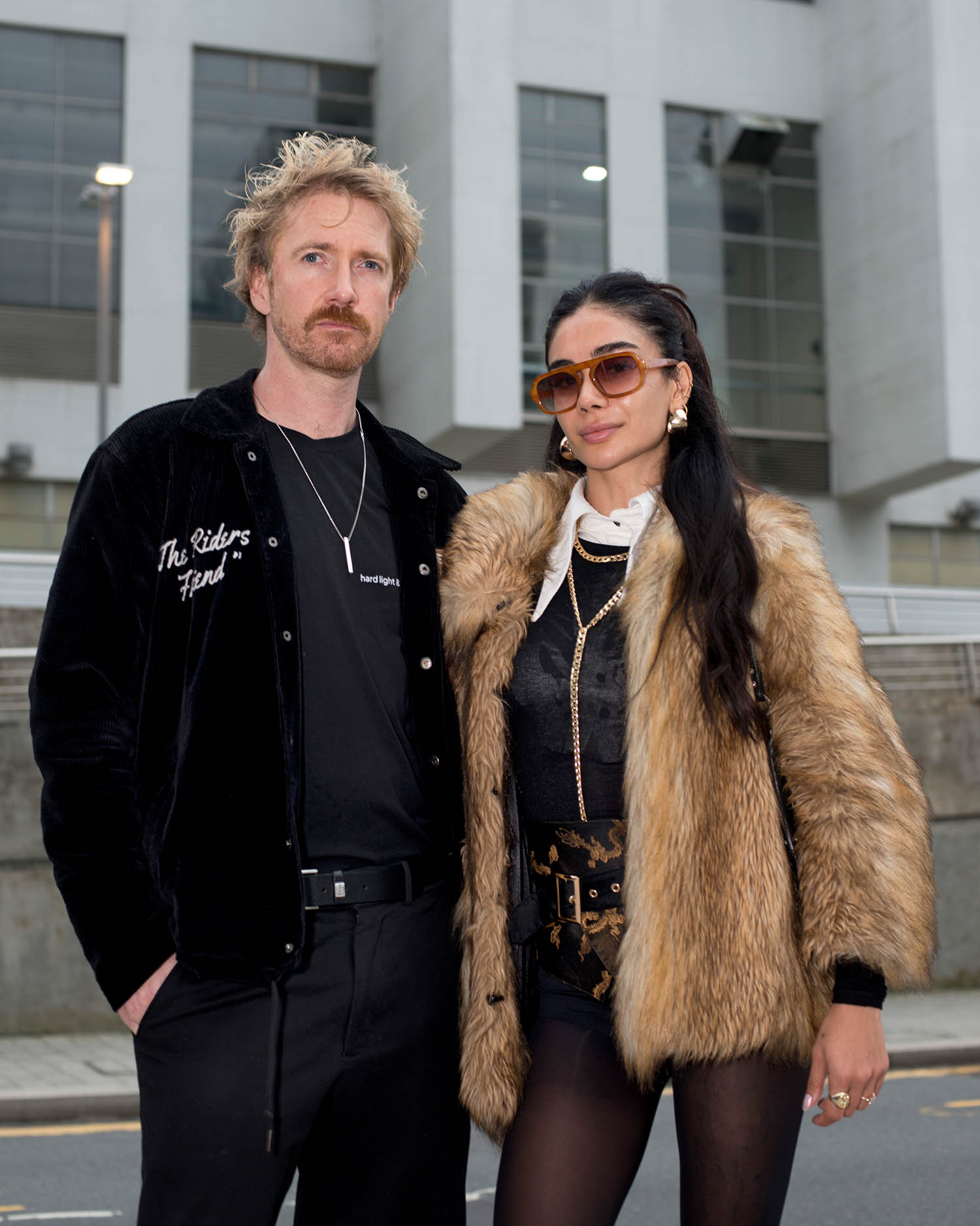
David, 41, from London, and Begum, 26, from Istanbul. David: ‘The world is looking the other way’
“Nor do I condone the atrocities that you have described; nor am I ignorant of them. I am aware of the injustices suffered by the Palestinian population, and wish, with all people of good conscience, that their suffering is ended via a comprehensive and just solution.”
This was a long time before October 2023. The past two years have seen unprecedented scenes of suffering and devastation coming out of Gaza: an aid blockade, the bombing of hospitals, the targeting of journalists and of people queuing for food aid. Now it seems a critical mass of anguish may have been reached; a once-marginalised cause has finally broken cover.
And while all artists should always be free to make their own choices, and musicians are not beholden to their fans or anyone else, cultural boycotts may help to isolate Netanyahu’s government, as they did the South African regime a generation ago, and increase the pressure on the country to change tack.
“Five years ago, perhaps even as recently as this time last year, it would have been impossible to imagine dozens of notable global artists coming together to support Palestine,” Eno suggests. “But the brutality of Israel’s assault on Gaza, its deliberate starvation of the population and the unabashed public statements of Israeli ministers advocating ethnic cleansing have combined to create deep cracks in the wall of fear.”
The director of the Palestine Solidarity Campaign, Ben Jamal, speaks at Wembley of a “watershed moment”. He points out that the Co-op has stopped stocking Israeli products and multiple music festivals have dropped Barclays Bank as a sponsor in response to the BDS movement.
Perhaps most memorably, he quotes the Egyptian writer Omar El Akkad. “One day, everybody will always have been against this.”
Newsletters
Choose the newsletters you want to receive
View more
For information about how The Observer protects your data, read our Privacy Policy
Other photograph by Luke Dyson
